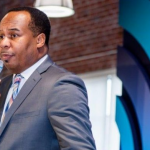When UAB employee Jamie Smith collapsed one morning while she was at work, UAB employees from multiple specialties stepped in to help save her life. (Ian Logue, UAB)
” data-medium-file=”https://www.birminghamtimes.com/wp-content/uploads/2025/02/Stream_A_blessing_to_be_here-1-300×225.png” data-large-file=”https://www.birminghamtimes.com/wp-content/uploads/2025/02/Stream_A_blessing_to_be_here-1-1024×769.png” tabindex=”0″ role=”button” />
One Saturday morning in June, Jamie Smith, 47, began her shift at the University of Alabama at Birmingham Hospital. What Smith thought would be a normal day led to her waking up in a hospital bed three days later.
“When I opened my eyes in the hospital room, I had no idea what had happened,” said Smith, who works for UAB Environmental Health and Safety. “My husband told me that I had gone into cardiac arrest while at work. I was in shock. I had felt a little tired the morning of my incident, but I had not experienced any chest pain or any other symptoms out of the ordinary. I almost did not believe that what he was telling me was real.”
Smith’s morning began with a team meeting where she and her colleagues received their assignments for the day. During the meeting, Alfredo Hines, Smith’s team leader, noticed that she was slumped over and had become unresponsive. He quickly ran to find the nearest health care professional. A team of UAB providers rushed to Smith’s aid and immediately began administering CPR.
They retrieved the closest AED and shocked Smith’s heart to get a rhythm back. They administered medication and took Smith down to the UAB Emergency Department, where her care team had to administer CPR two more times to keep her alive.
“Mrs. Smith’s care was a collaborative effort among many different specialties across UAB,” said Darryl Prime, M.D., an interventional cardiologist at the UAB Cardiovascular Institute who helped Smith that day. “An impressive amount of coordination took place between bystander witnesses, personnel who went to get the AED, transport who quickly got her to the emergency room and the emergency response team. The team was incredibly efficient. They came together and acted quickly to save Mrs. Smith’s life.”
” data-medium-file=”https://www.birminghamtimes.com/wp-content/uploads/2025/02/1209341791428537.VGOP0oVLNrpeoCy2NLvA_height640-226×300.png” data-large-file=”https://www.birminghamtimes.com/wp-content/uploads/2025/02/1209341791428537.VGOP0oVLNrpeoCy2NLvA_height640.png” tabindex=”0″ role=”button” class=”wp-image-126644 size-full” src=”https://www.birminghamtimes.com/wp-content/uploads/2025/02/1209341791428537.VGOP0oVLNrpeoCy2NLvA_height640.png” alt=”” width=”361″ height=”480″ srcset=”https://www.birminghamtimes.com/wp-content/uploads/2025/02/1209341791428537.VGOP0oVLNrpeoCy2NLvA_height640.png 361w, https://www.birminghamtimes.com/wp-content/uploads/2025/02/1209341791428537.VGOP0oVLNrpeoCy2NLvA_height640-226×300.png 226w, https://www.birminghamtimes.com/wp-content/uploads/2025/02/1209341791428537.VGOP0oVLNrpeoCy2NLvA_height640-316×420.png 316w” sizes=”(max-width: 361px) 100vw, 361px” />
In the emergency department, Smith was taken to the cardiac catheterization lab, and Prime performed a heart catheterization, a procedure that helps diagnose certain heart problems. The same day, Prime also inserted an intra-aortic balloon pump, which is a temporary device to help the heart pump more blood as it recovers from shock.
During her three days at UAB, Smith was intubated and eventually extubated once she was stable. After waking up, Smith discovered that she been diagnosed with stress cardiomyopathy, commonly known as broken heart syndrome, which is a condition that can weaken the heart muscles.
As she begins the new year, Smith says she is very grateful to have survived cardiac arrest.
“Words cannot explain how grateful I am to Dr. Prime and the rest of my care team at UAB,” Smith said. “After coding three times, it is a blessing to be able to be here this new year and still be able to work and spend time with my family. It is such a big deal.”
After her procedure, Smith wore a heart monitor for a few months and a device that would shock her heart if she experienced heart problems again. Today, Smith is no longer wearing any devices; but she continues to attend UAB’s Cardiopulmonary Rehabilitation Program, which provides a structured exercise regimen for patients recovering from heart problems. Smith is back at work and has returned to her normal routine. While she continues to see Prime for her checkups, she says she is feeling much better and has continued to recover well.
“One takeaway from this story is that Mrs. Smith was lucky enough that she had bystanders who were health care providers who were well-trained in CPR and AED use,” Prime said. “This is sometimes not the case when something like this occurs in the community. For every minute that passes from a collapse from ventricular fibrillation, the chance of survival decreases by 10 percent each minute without bystander CPR. That is a 100 percent chance of death in 10 minutes. Education about CPR and AED use in the community thus is extremely important and can empower individuals to take the necessary steps to help save the life of someone who may experience an incident like Mrs. Smith.”
Learn more about sudden cardiac arrest and how to respond at uab.edu/news.











